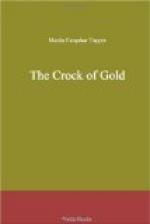He lives, nobody knows how—on bright, clean gold, nobody knows whence: his daughter says, indeed, that her father found a crock of gold in his garden—but she needs not have held her tongue so long, and borne so many insults, if that were all the truth; and, mark this! even though she says it, and declares it on her Bible-oath, Acton himself most strenuously denied all such findings—but went about with impudent tales of legacy, luck, nobody knows what; the man prevaricated continually, and got angry when asked about it—cudgelling folks, and swearing like—like any one but old-time “honest Roger.”
Only look, too, where he lives: in a lone cottage opposite Pike Island, on the other side of which is Hurstley Hall, the scene of robbery and murder: was not a boat seen that night upon the lake? and was not the lawn-door open? How strangely stupid in the coroner and jury not to have imagined this before! how dull it was of every body round not to have suspected murder rather more strongly, with those finger-marks about the throat, and not to have opened their eyes a little wider, when the murderer’s cottage was within five hundred yards of that open lawn-door!
Then again—when Mr. Jennings, in his strict and searching way, accused the culprit, he never saw a man so confused in all his life! and on repeating the charge before those two constables, they all witnessed his guilty consternation: experienced men, too, they were, and never saw a felon if Acton wasn’t one; the dogged manner in which he went with them so quietly was quite sufficient; innocent men don’t go to jail in that sort of way, as if they well deserved it.
But, strongest of all, if any shadow of a doubt remained, the most fearful proof of Roger’s guilt lay in the scrap of shawl—the little leather bags—and the very identical crock of gold! There it was, nestled in the thatch within a yard of his head, as he lay in bed at noon-day guarding it.
One proof, weaker than the weakest of all these banded together, has ere now sufficed to hang the guilty; and many, many fears have I that this multitude of seeming facts, conspiring in a focus against Roger Acton, will be quite enough to overwhelm the innocent. “Nothing lies like a fact,” said Dr. Johnson: and statistics prove it, at least as well as circumstantial evidence.
The matter was as clear as day-light, and long before the trial came about, our poor labourer had been hanged outright in the just judgment of Hurstley-cum-Piggesworth.
CHAPTER XXXVI.
PRISON COMFORTS.
MANY blessings, more than he had skill to count, had visited poor Acton in his cell. His gentle daughter Grace, sweet minister of good thoughts—she, like a loving angel, had been God’s instrument of penitence and peace to him. He had come to himself again, in solitude, by nights, as a man awakened from a feverish dream; and the hallowing ministrations of her company by day had blest reflective solitude with sympathy and counsel.




